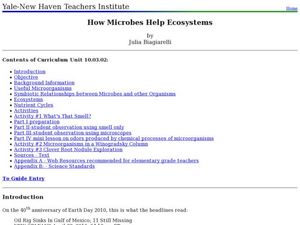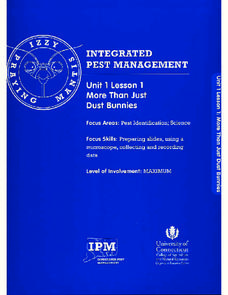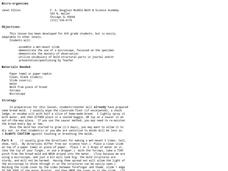Curated OER
Plastic Bag Pond
Students investigate the pond water from a local water source. They collect the pond water from the bottom or near vegetation in order to obtain the best sample possible. Then they use microscopes in class in order to examine the life...
Curated OER
Microscope Mania
Learners examine parts of a microscope and how to use a microscope at five lab stations. They identify parts of a microscope by describing the differences between low power and high power. They visit Internet sites (included in the...
Baylor College
Tools of Magnification
Life science learners need to be able to use a microscope. With this comprehensive resource, they first experience how lenses and magnification work, and then get familiar with using a compound microscope. Tremendous background...
National Nanotechnology Infrastructure Network
Introduction to Nanotechnology Using the Creative Problem-Solving Model
Should we continue to spend money on nanotechnology? Groups engage in a problem-solving unique process around the newly emerging research field of nanotechnology. In order to propose a solution, the groups must research nanotechnology...
Curated OER
18th Century Microscope
Students examine a microscope from the 18th century. In this microscope lesson plan, students investigate how it works, what it was used for and how the tool has evolved through the years. Students also build knowledge on how compound...
Curated OER
How Microbes Help Ecosystems
Sixth graders observe different microorganisms under the microscope. In this biology lesson, 6th graders draw and describe the samples they see. They study the root nodules of plants and explain how the plants benefit from those bacteria.
University of Connecticut
More Than Just Dust Bunnies
Teenagers will never complain about cleaning their rooms after this activity. In the first activity of a four-part series, budding scientists collect samples of dust, chalk, and other particulates from various areas of the...
Curated OER
Cells: A First-Hand View
In the first of two activities, your charges prepare wet mount slides of cork and bean sprout cells in imitation of Robert Hooke's historical investigation. An excerpt from his notes is included. Then, investigators compare animal cells...
Curated OER
Microfishing
Students use a simple method to collect living microorganisms from natural and/or artificial environments and develop skills in microscopy, observation, drawing, speculation, hypothesizing, oral presentation, and raising questions.
Curated OER
Plankton in the Air
Here is a lab activity adequate for use with any full lesson plan on environmental factors that shape animal adaptations or marine animal characteristics. Pupils will discuss the role plankton plays in the environment and filter-feeding...
NOAA
Deep-Sea Ecosystems – Chemosynthesis for the Classroom
Photosynthesis was discovered in the 1770s, but chemosynthesis wasn't discovered until 1977. While many have performed an experiment to show how photosynthesis works, the activity allows pupils to observe chemosynthesis. Scholars set up...
Curated OER
Life in a Forest Stream
Students assess macro-invertebrates from a stream. In this science lesson plan, students observe, classify and identify organisms found in a stream. A lab station is constructed at the stream sight and students study the different...
Curated OER
Investigating Animals in Soil
Young scholars investigate and observe small animal activity on a plot of land on their school grounds. In small groups they identify the five kingdoms of animals, stake out a small plot of ground, collect samples, record and analyze...
Curated OER
What in the World..?!?
Pupils photograph mystery images. In this observation skills lesson, students gather everyday objects and place them under a digital microscope. They magnify the image and take a photograph of it. The image is then displayed on the...
Curated OER
Critters in the Classroom
Students investigate with sea urchins. In this ocean habitat lesson, students observe sea urchins and other ocean grazers. Students work with lab equipment to examine the anatomy of these creatures.
Curated OER
Chemosynthesis in the Classroom
Young scholars observe the development of chemosynthesis in bacterial communities. In this bacteria lesson students explore that chemosynthesis is and how it is relevant to biological communities.
Curated OER
Invisible Life
By setting up an aquarium in the classroom, learners are able to describe some macroscopic and microscopic organisms that are found inside. This well-designed, and educationally rich lesson requires pupils to use microscopes to view...
Curated OER
It's Just Dirt
Students discover how seed germination varies according to the soil type. In this soil science lesson, students discuss what plants need in order to grow and investigate various types of soil. Students use their senses to describe each...
Curated OER
Chemosynthesis for the Classroom
Explorers set up Windogradsky columns with local mud so that they can culture microorganisms. After three and six weeks they make observations of the mud and the organisms growing in it. In this way they observe succession and relate...
Curated OER
Micros-organisms
Sixth graders examine mold with a microscope. In this micro-organisms lesson, 6th graders use teacher-prepared mold samples to prepare a wet-mount slide and examine the mold under a microscope then draw and label what they see.
Cornell University
Plant Cell Crime Scene
Use science to solve the mystery of the Poplar murder. Pupils use forensic botany to determine if a suspect could be the killer. By analyzing images from a Transmission Electron Microscope, learners determine if the material found on the...
Baylor College
Magnifying and Observing Cells
Though it isn't a novel activity to prepare onion cell and Elodea plant cell slides as examples of cells in a microbiology unit, this resource will leave you thoroughly prepared. As pupils examine the slides that they prepare, they draw...
Curated OER
Creatures That Glow In The Night
Young scholars investigate the different bioluminescent organisms. They use microscopes in order to make observations and draw what is seen. Students demonstrate they have studies the differences between the process of photosynthesis and...
Curated OER
Bacteria's Role in Food
Young scholars grow bacteria cultures on agar in petri dishes and do a plate count. They participate in a yogurt making lab to see how bacteria produce lactic acid. They prepare a recipe and identify fungi, fermentation and the role of...























